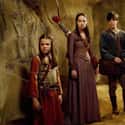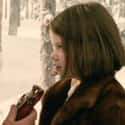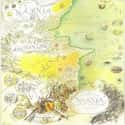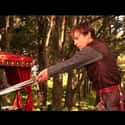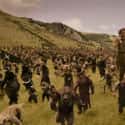-
(#1) Girly-Girls Don't Get To Go To Heaven
The fate of Susan has been hotly debated for ages. According to Peter, she's "no longer a friend of Narnia," and Jill explains that, "she's interested in nothing now-a-days except nylons and lipstick and invitations." Sure, it's not nice, and sure, it's not explicitly said that Susan will never get to Narnia, only that she isn't there at the time.
But that doesn't erase the fact that her story is never finished, and that her siblings seemingly don’t care she may never join them in Heaven. Worse, Susan – because she denies her belief in a magical land you travel to in a wardrobe in a time when saying such a thing (especially as a woman) could get you thrown in a horribly abusive asylum – now has three dead siblings, a dead cousin, and apparently two dead parents as well. Remember, the other Pevensies see them all in Heaven, except for Susan. She's all alone for the crime of trying to grow up at a reasonable rate.
-
(#2) Someone Can Destroy The World With A Single Word
Jadis is hardly a sympathetic figure, but when Polly and Diggory enter her world in The Magician's Nephew, they find it to be a dead, dreary place illuminated only by a sun on the verge of dying. And it's all Jadis' fault.
After learning the Deplorable Word (a spell to destroy all life), she uses it after losing a fight with her sister. There's no explanation given for why such a spell would exist in the first place, nor is there any way to stop it, so the world of Charn simply exists under constant threat of total annihilation based on the whims of its cruel leaders.
-
(#3) Time Differences Mean Your Consciousness Might Be Centuries Old
The Pevensie children enter Narnia as children, with the oldest, Peter, only 13 years old. The first time they leave Narnia, they're fully grown adults with little memory of their previous lives until they stumble back to England through the wardrobe. And this isn't the last time they travel to and from Narnia. It happens a couple more times, with strange time dilation making it feel as though no time has passed in England at all.
Sure, it's the ultimate escapist fantasy, but it's also a little troubling. The Pevensie children, and later Jill and Eustace, all spend lots of time in Narnia experiencing terrifying situations and events suited for adults. Though they might be children in appearance, their actual age is quite different. Even if it fades as they spend time in their own world, it's a little creepy, not to mention frustrating. Can you imagine having the consciousness of a 42-year-old woman trapped in a child's body? You couldn't drink wine or go on a date or have any kind of meaningful discussion with your peers.
-
(#4) Changing An Entire Race's Appearance And Function Is Fine If You're Aslan's Buddy
The entirety of the Dawn Treader's stay at Coriakin's island is bizarre. After speaking to a group of invisible beings, Lucy is tasked with making them visible again, only to find out that the Dufflepuds turned themselves invisible, not, as they claimed, the magician Coriakin. But then it gets disturbing.
It turns out the Dufflepuds were originally dwarves, and they were turned into one-footed creatures by the magician because they disobeyed him. Coriakin is a kindly figure shown to be friends with Aslan, making this whole situation utterly bizarre. Though the magician is the Dufflepuds' overseer, it seems unnecessarily cruel to completely change their appearance because they didn't listen, but apparently it doesn't matter because he's friends with Aslan.
-
(#5) Women Are Healers, Men Are Fighters
"Battles are ugly when women fight," Father Christmas tells Lucy in The Lion, The Witch, and the Wardrobe. Not "battles are ugly when children fight," which is true, nor, "battles are ugly," which is also true, but specifically that battles are ugly when women fight, which is bullsh*t. That's why Lucy is given a healing cordial and Susan is given a magic, help-summoning horn, but Peter is given a sword.
Though Susan and Lucy are given tools to defend themselves, both are specifically told the means NOT to use them. Women are meant to support the men in battle with their healing and magic horns, not fight for themselves, no matter how much is at stake. In a world with witches, talking animals, and magical beasts, women are still relegated as helpers, not warriors.
-
(#6) The Almost Inherently Bad Guys Are Racially Coded As "Not White"
While Narnia, thankfully, doesn't entirely code white as good and black as bad – The White Witch is a nice thumb in the eye of that trope – that doesn't mean the series is free of troubling associations with race. Specifically, the Calormenes.
Described as having dark skin, occupying a desert, and wearing turbans, the Calormenes are a pretty clear analog to Middle Eastern people, who, in Lewis's time (and, frankly, in modern Western culture), were often vilified. In Narnia, the Calormenes are violent, barbaric slave traders and the biggest supporters of Tash (a demonic deity of a state-sponsored religion) in The Last Battle. The Horse and His Boy does feature two Calormene characters who are clearly good, moral heroes, but they're painted as the exception, not the rule. Just because you feature "some of the good ones," that doesn't make your book less racist.
-
(#7) You Can Forget Your Whole Life Because Narnia Is So Much Better
Spend enough time in this magical land of talking animals and magic, and you might forget your old life. Maybe the Pevensie children needed a break from the very real stresses of World War II, but it's still more than a little eerie that, after spending time as adults in Narnia, they barely remember their time in England.
At the end of The Lion, The Witch, and the Wardrobe, Lewis writes that they only remember England as if it was a dream, and, when they encounter the lamppost that welcomed them to Narnia, they aren't sure why it seems familiar. Conceivably, they could have spent their entire lives there after forgetting where they came from, dying in Narnia and leaving their loved ones (not to mention their caregiver, Professor Kirke) to wonder what became of them.
-
(#8) Teaching Little Kids To Kill Is Super Dope
Battles may be ugly when women fight, but when 13-year-old boys fight, battles are proving grounds. In The Lion, The Witch, and the Wardrobe, Peter must prove himself in front of Aslan by slaying the wolf that's threatening his sister. Nevermind that Peter is only a year older than Susan, nor that Aslan (the giant f*cking lion) is right there; instead, he has to test his new sword against a battle-hardened wolf.
Aslan may have known Peter would win, and that there were even harder battles in Peter's future, but there's still something deeply disturbing about a Jesus-inspired lion teaching a young boy how to kill so he can properly rule a country that isn't his own.
-
(#9) Progressive Parents Make For Selfish, Weak Kids
Eustace Scrubb is introduced as a boy so awful that he deserves his stupid, dumb name. The reason for his terrible nature? His parents, because they are liberal vegetarians who don't smoke or drink. While it's true that Lewis doesn't explicitly make the connection, all this information is given in conjunction with the proclamation that Eustace is just the worst.
To be fair, Eustace could just be a little jerk on his own. But because traits like vegetarianism were considered somewhat highfalutin by a man as nostalgic for the past as Lewis, it's hard not to read Eustace's upbringing as the reason for his selfish, whiny, awful mannerisms. Well, at least until he turns into a dragon.
-
(#10) Some Folks Are Just Innately Evil
The Chronicles of Narnia do sometimes play with the idea of good and evil. Edmund and Eustace, who both start out as self-serving characters, eventually come around to being good. But there are also a whole host of people who just seem to be inherently evil.
When the White Witch gathers her followers for battle, she calls upon entire species, such as werewolves, ogres, and ghouls. Throw that in with the overall treatment of the Calormenes and you have a pretty bleak and clear thesis that some races and species are inherently evil, a nasty statement for a book so clearly rooted in religious allegory.
-
(#11) An Entire Fantasy World Is Waiting For Four White British Kids To Save It
Prophecies in fantasy are all well and good, but it's a little troubling that the world of Narnia is explicitly waiting for four white British kids to arrive and be the saviors of a world packed with sentient animals and, outside of Narnia, quite a few humans. Why were none of them eligible to sit at Cair Paravel and save Narnia from the White Witch?
It's not so much that this is a plot hole or something wrong with the story – it works quite well as an escapist fantasy – but rather that it paints a pretty bizarre picture of Narnia when the world's inhabitants aren't allowed to be its saviors. Frankly, it smacks of "The White Man's Burden."
-
(#12) Narnia Is An Ancient Civilization With Zero Technological Growth
As we know, Narnia has existed for ages. More than one kingdom rises and falls within the books alone, and over a thousand years pass between the Pevensie reign and Prince Caspian's time. And yet, there's no technological growth throughout Narnia, as it remains a feudal world of magic and mystery throughout the entire series.
While that might paint it as a whimsical fantasy realm, it also raises some troubling questions. If Narnia mirrors our world in any way, it's likely susceptible to the nastier parts of medieval life, too. High infant mortality, plague, starvation, and oppression of lower classes likely run rampant. It's possible that Narnia replaces things like medicine with magic, but that's not something everybody has access to. Though Lewis may be looking back at medieval times through fantasy rose-colored glasses, the lack of advancement in 2000 years leaves a lot of lingering questions about quality of life in Narnia.
-
(#13) Impossibly Powerful Gods Are Just Casually Running Around
As with many mythological pantheons, the Narnian gods are part of everyday life. You might run into Aslan or Tash, both of whom are fearsome regardless of your religious alliance. And they aren't the only ones. Roman gods show up too, such as Bacchus. Narnia, then, is a place where you can casually bump into a god (or god-like figure) just going about your business, and the results might not be as good as you'd hope.
After all, Aslan isn't a tame lion, and Bacchus is well known for having followers driven to madness and violence. With sentient beasts, witches, and numerous other threats to deal with, having gods walking around is just another nightmare to contend with in Narnia.
New Random Displays Display All By Ranking
About This Tool
Our data comes from Ranker, If you want to participate in the ranking of items displayed on this page, please click here.



